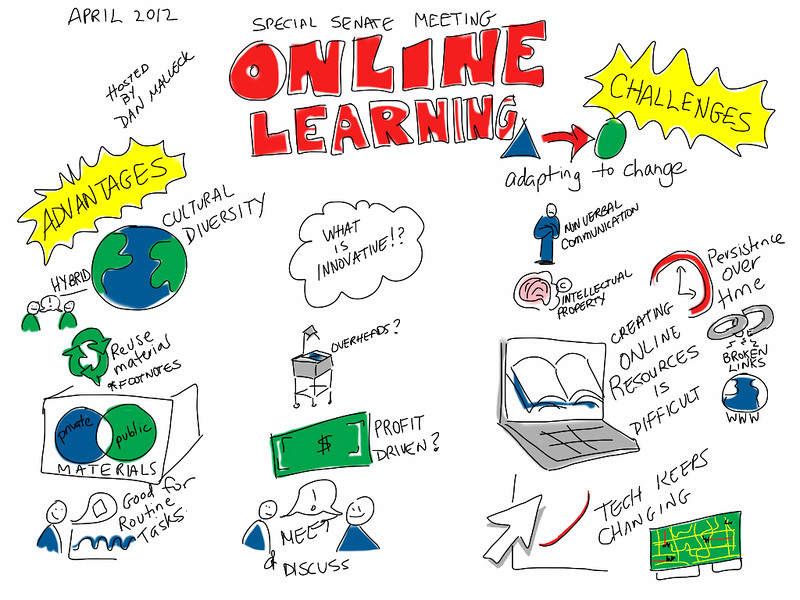Table of Contents
Introduction
In the fast-evolving landscape of education, traditional boundaries are giving way to a new era marked by the prominence of online learning. The digital revolution has not only reshaped how we communicate and work but has also transformed the way we acquire knowledge. This article is a deep dive into the multifaceted advantages that online learning brings to the table, elucidating why it has become a preferred mode of education for many. From flexibility and diverse course offerings to career advancement opportunities and global connectivity, let’s unravel the top 10 benefits that make embracing online learning a transformative journey.

**1. Flexibility in online Learning
One of the defining features of online learning is the unparalleled flexibility it offers to learners. Unlike traditional classrooms with fixed schedules, online courses provide the freedom to create personalized study routines. Whether you are a working professional, a parent, or someone with multiple commitments, the flexibility to choose when and where you learn becomes a game-changer. This adaptability fosters a better work-life balance and allows individuals to pursue education without disrupting their existing responsibilities.
The asynchronous nature of online courses further amplifies this flexibility. Recorded lectures and accessible materials mean that students can revisit and engage with the content at their own pace. The elimination of rigid schedules not only accommodates different time zones but also caters to diverse learning styles, making education more accessible to a broader audience.
2. Diverse Course Offerings
Online learning platforms present a diverse and expansive menu of courses, catering to a myriad of interests and professional paths. Unlike traditional institutions limited by physical infrastructure, online education transcends geographical boundaries, connecting learners with specialized courses globally. Whether one is interested in data science, digital marketing, or the arts, online platforms offer a wealth of choices, ensuring that education aligns with individual passions and career aspirations.
This diversity extends to multidisciplinary exploration, where learners can seamlessly navigate through various subjects, creating a holistic understanding of different domains. The accessibility of diverse courses not only enriches the educational experience but also promotes a culture of continuous learning and exploration.
3. Cost-Effectiveness
Traditional education often comes with a hefty price tag, including tuition fees, accommodation, and commuting expenses. Online learning, however, presents a more cost-effective alternative. The absence of physical infrastructure reduces overhead costs for institutions, resulting in lower tuition fees for students. Additionally, online learners save on commuting and accommodation expenses, making quality education more affordable and accessible.
The cost-effectiveness of online learning is particularly advantageous for individuals who may be constrained by financial considerations. It democratizes education, breaking down economic barriers and ensuring that learning opportunities are not limited by one’s financial circumstances.
4. Personalized Learning Experience
Online learning places a strong emphasis on individualized learning paths, tailoring the educational experience to the needs and pace of each learner. The ability to progress through the material at one’s own speed allows for a deeper understanding of concepts. Advanced learners can move ahead quickly, while those who require more time can revisit and reinforce their understanding without feeling rushed.
Adaptive learning technologies further enhance personalization by adjusting the difficulty level of content based on individual performance. This dynamic approach ensures that each learner receives a customized educational journey, fostering a more engaging and effective learning experience.
5. Access to Global Experts
Online learning opens up a virtual gateway to global expertise. Through virtual classrooms, webinars, and collaborative projects, students can connect with and learn from experts and professionals worldwide. This exposure to diverse perspectives enriches the educational experience, offering insights and knowledge that may not be readily available within the confines of a traditional classroom.
This global connectivity also extends to networking opportunities. Online learners can build professional relationships with individuals from different industries and cultures, creating a valuable network that spans geographical boundaries. The connections made during online courses can lead to mentorships, collaborations, and job opportunities, enhancing both the educational and professional dimensions of one’s journey.
6. Improved Time Management Skills
Juggling work, family, and education is a common challenge for many individuals. Online learning inherently cultivates effective time management skills as students navigate their educational journey. The need to balance diverse responsibilities fosters a sense of discipline and organization, skills that extend beyond the realm of academia and prove invaluable in various aspects of life.
The ability to manage time efficiently becomes a key asset in the professional world, where deadlines and multitasking are commonplace. Online learners develop a heightened sense of responsibility and self-discipline, traits that contribute to success not only in their educational pursuits but also in their careers.
7. Enhanced Technical Proficiency
In the digital age, proficiency in technology is a prerequisite for success in various fields. Online learning naturally exposes students to a plethora of digital tools and platforms, enhancing their technical proficiency. Navigating virtual classrooms, collaborating on online projects, and engaging with multimedia content contribute to the development of digital literacy skills.
This enhanced technical proficiency is not just limited to the educational sphere but extends to the professional realm. Graduates of online programs enter the workforce with a level of comfort and familiarity with technology, giving them a competitive edge in an increasingly digital job market.
8. Interactive Learning Tools
Online courses often incorporate interactive tools that go beyond traditional teaching methods. From virtual simulations to gamified elements and collaborative projects, these tools make learning engaging and practical. Interactive assessments and quizzes not only test knowledge retention but also reinforce theoretical concepts in a dynamic and interactive manner.
The use of discussion forums and group activities fosters a sense of community among online learners. The exchange of ideas and perspectives in virtual spaces contributes to a collaborative learning environment, creating a sense of connection that defies physical distances.
9. Career Advancement Opportunities
Acquiring new skills through online learning can be a catalyst for career advancement. Many employers value the dedication and self-discipline demonstrated by online learners. The ability to balance work and education showcases a proactive approach to professional development, making online learners desirable candidates for promotions and new opportunities.
Online certifications and degrees are increasingly recognized by employers, especially when obtained from reputable institutions. The tangible skills acquired through online learning programs directly align with the demands of the evolving job market, positioning graduates as valuable assets to their respective industries.
10. Social Connectivity in Virtual Spaces
Contrary to the perception that online learning is isolating, virtual classrooms foster social connectivity. Discussion forums, group projects, and live sessions create a sense of community among learners. The collaborative nature of online courses encourages the exchange of ideas, creating virtual bonds that extend beyond the digital realm.
This social connectivity is not limited by geographical constraints. Online learners can interact with individuals from different parts of the world, bringing diverse perspectives to discussions and projects. The relationships forged in virtual spaces contribute to a supportive and collaborative learning environment, challenging the notion that physical presence is a prerequisite for meaningful social interactions.
11. Environmentally Friendly Education
Online learning aligns with the growing awareness of environmental sustainability. By reducing the need for physical resources like paper and transportation, online education contributes to a more eco-friendly educational system. Digital textbooks, online assessments, and virtual classrooms significantly decrease the carbon footprint associated with traditional education.
The environmentally friendly approach of online learning is a testament to its adaptability and responsiveness to contemporary global challenges. As the world increasingly prioritizes sustainable practices, online education emerges as a model that not only meets educational needs but also aligns with broader environmental goals.
12. Overcoming Geographical Barriers
Geographical constraints are a significant impediment to traditional education. Remote or underserved areas may lack access to quality educational institutions. Online learning bridges this gap, erasing geographical barriers and providing individuals from remote locations with the opportunity to access high-quality education.
The elimination of geographical restrictions also benefits individuals with mobility issues or those facing other physical limitations. Online education ensures that education is truly inclusive, allowing learners from diverse backgrounds and circumstances to pursue their educational goals without being hindered by geographical constraints.
13. Continuous Learning Culture
Online learning nurtures a culture of continuous learning. With easily accessible resources, learners can stay updated on industry trends and acquire new skills throughout their careers. The fluidity of online education encourages individuals to embrace a mindset of lifelong learning, recognizing that knowledge is dynamic and constantly evolving.
The ability to adapt to new technologies and stay abreast of industry changes becomes ingrained in the online learner’s journey. This continuous learning culture is not only beneficial for personal growth but also aligns with the demands of a rapidly changing global landscape where staying relevant is key to professional success.
Conclusion
Embracing online learning transcends mere convenience; it revolutionizes the very essence of how we acquire knowledge. The flexibility, diversity, and accessibility inherent in online education empower learners, making it a cornerstone of the future of learning. As technology continues to advance, online learning will play an increasingly vital role in shaping the educational landscape, breaking down barriers and creating opportunities for learners worldwide.
In a world where adaptability and lifelong learning are imperative, online education emerges as a beacon of transformation, offering a gateway to knowledge that knows no bounds. The benefits outlined in this comprehensive exploration underscore the transformative power of online learning, inviting individuals to embark on a journey where education is not confined by walls but extends to the far reaches of a digital horizon.
Frequently Asked Questions (FAQs)
- Is online learning suitable for all types of courses?
- Online learning accommodates a wide range of courses, from technical subjects to humanities, making it versatile and suitable for various disciplines.
- How can online learning enhance my career prospects?
- Online learning allows you to acquire new skills and stay relevant in your industry, making you a valuable candidate for career advancement opportunities.
- Are online courses recognized by employers?
- Many employers recognize the value of online courses, especially if obtained from reputable platforms or institutions.
- Can I interact with instructors in online courses?
- Yes, most online courses provide opportunities for interaction with instructors through discussion forums, live sessions, and emails.
- What makes online learning environmentally friendly?
- Online learning reduces the need for physical resources like paper and transportation, contributing to a more sustainable and environmentally friendly education system.










corticotropin xyandanxvurulmus.mKicV4KoyalB